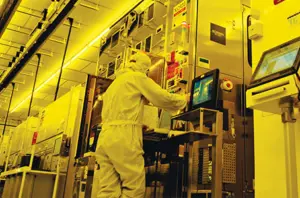Taiwan Semiconductor (TSMC) reported a 13.6% sequential increase in net revenue for July, reaching NT$177.62 billion ($5.5 billion). When compared to the previous year, the company experienced a 4.9% decline in net revenue. This trend aligns with the company’s broader performance this year, as its top-line has contracted by nearly 3.7% so far. Because TSMC makes chips for leading technology companies like Apple and Nvidia, the company is one of the best gauges of demand for semiconductors, and its performance can hint at the opportunities and challenges facing the industry as a whole. The impact will, no doubt, also be felt by some segments of the display industry.
| (In millions) | Jul-23 | Jun-23 | MoM Change | Jul-22 | YoY Change | 1H23 | 1H22 | YoY Change |
| Net Revenue | $5,506 | $4,839 | 13.6% | $5,790 | -4.90% | $36,180 | $37,571 | -3.7% |
TSMC is predicting a 9.1% increase in third-quarter consolidated sales compared to the second quarter, projecting a figure of around $17.1 billion. This optimistic outlook is attributed to robust market demand for 3 nm chips, which is expected to offset any adverse impacts stemming from inventory adjustments made by TSMC’s customers. Notably, the surging demand for AI servers is notably contributing to the elevated orders for TSMC’s 3nm process chips. This demand dynamic is driving the company’s revenue growth and reinforcing its technological relevance.
However, the company’s financial prospects for the upcoming months exhibit certain challenges. Analysts anticipate that the average monthly revenue for August and September could range between NT$168.4 billion ($5.2 billion) and NT$180.9 billion ($5.6 billion), and TSMC has provided guidance that this year’s revenues may be down byy 10% over last year. The gross margin for the third quarter is projected to hover between 51.5% and 53.5%. These numbers reflect the fact that the 3nm process is not yet operating at commercial scale, a factor that tempers immediate profitability. Additional pressures come from external factors, including an increase in electricity rates in Taiwan, which is predicted to impact TSMC’s gross margin.
Recently, TSMC unveiled a significant joint venture involving Germany’s Robert Bosch, Infineon, and NXP Semiconductors, together investing in the European Semiconductor Manufacturing Company (ESMC) with an investment of 10 billion euros ($11 billion). The 300mm fab is projected to boast a remarkable production capacity of 40,000 300mm wafers. TSMC will hold a 70% stake, with construction scheduled to commence in the latter half of 2024.

